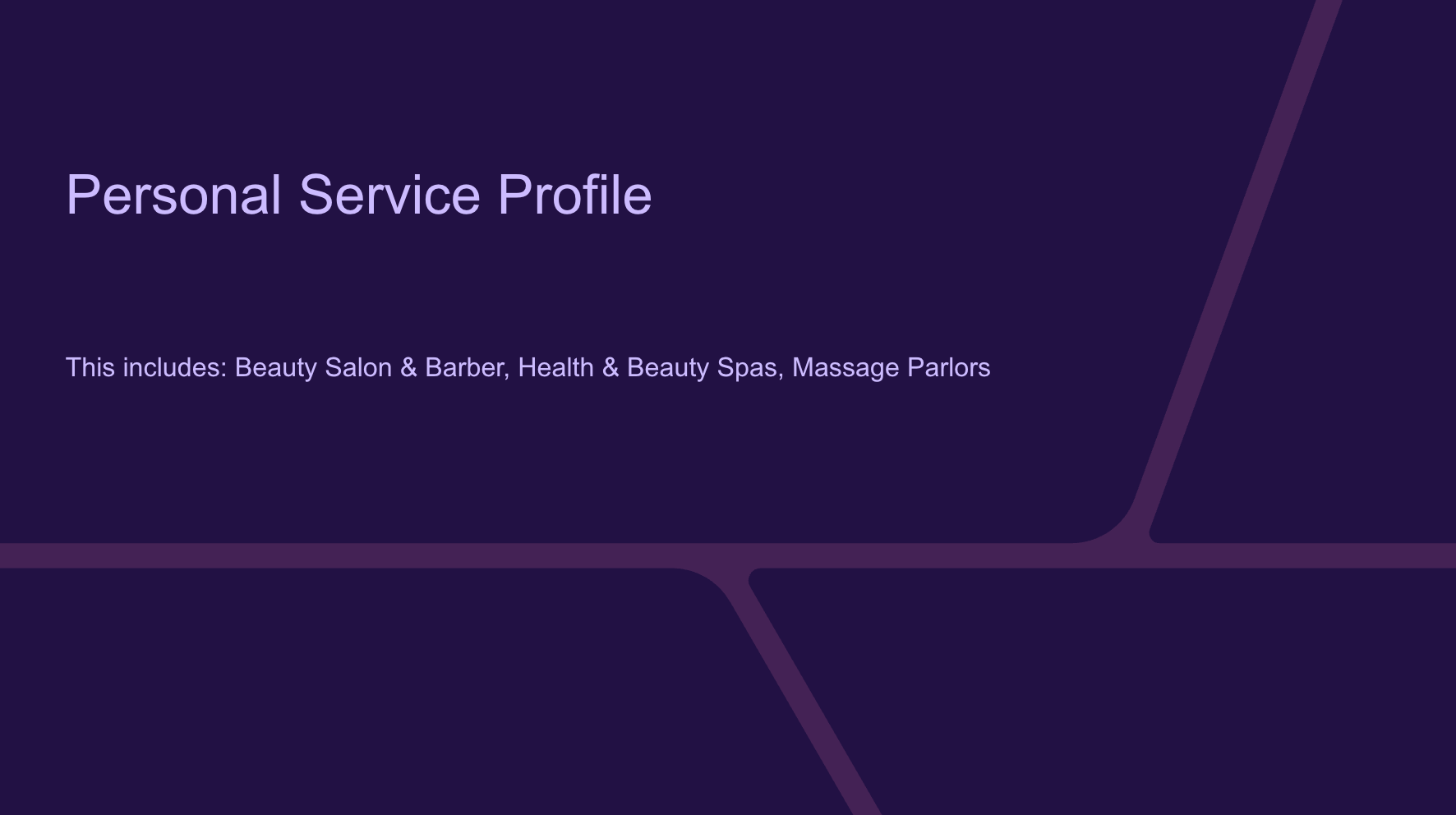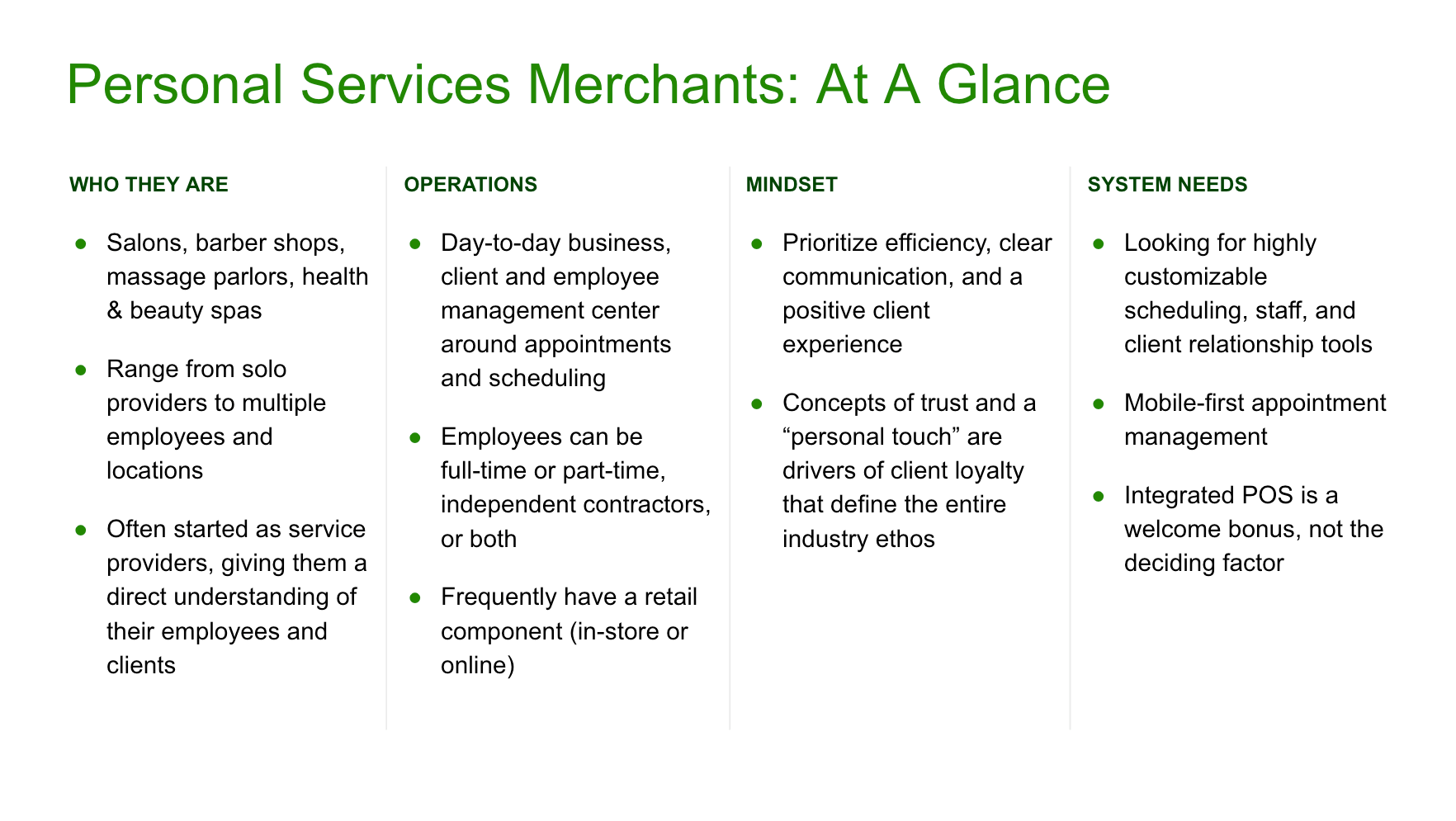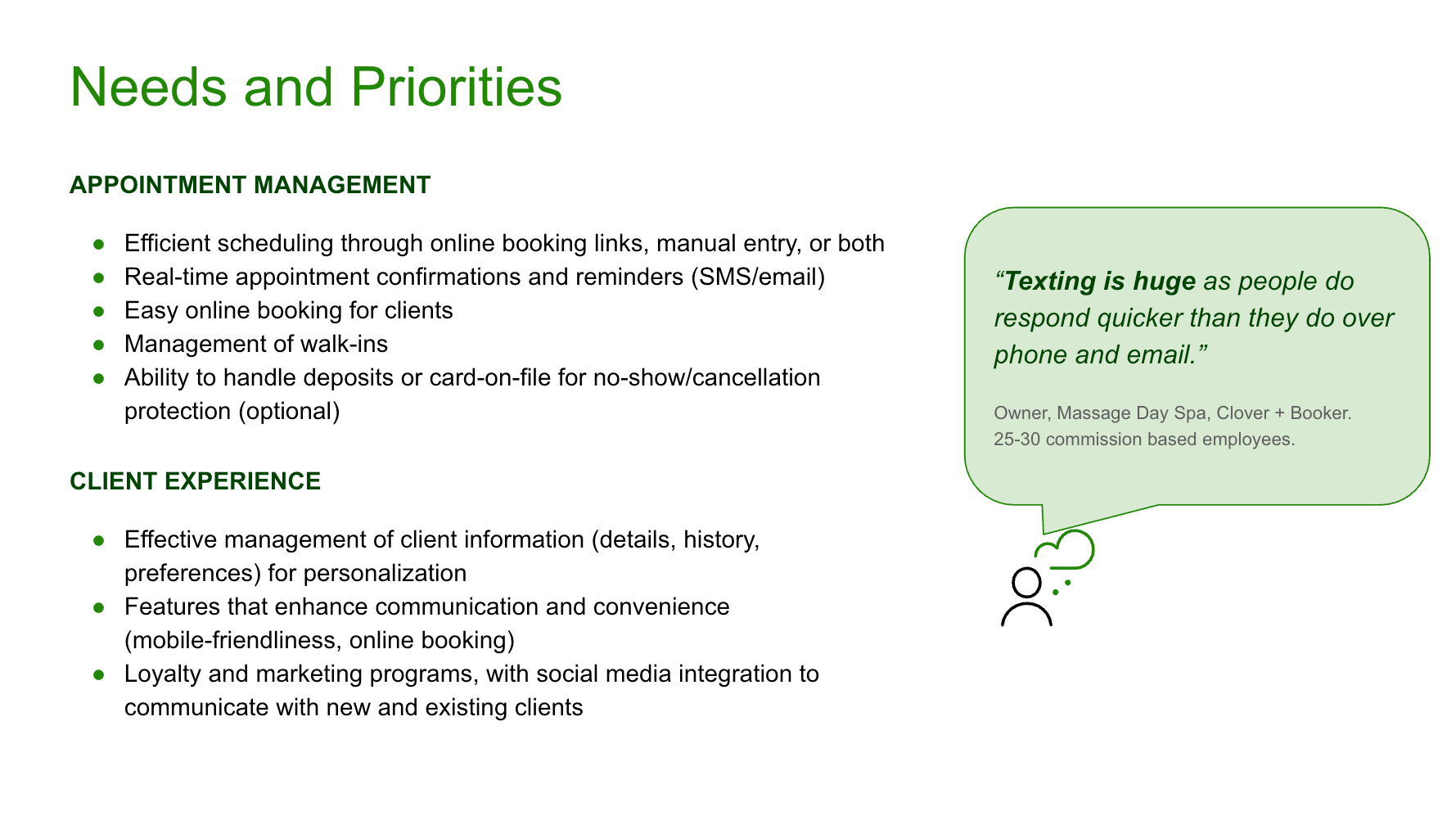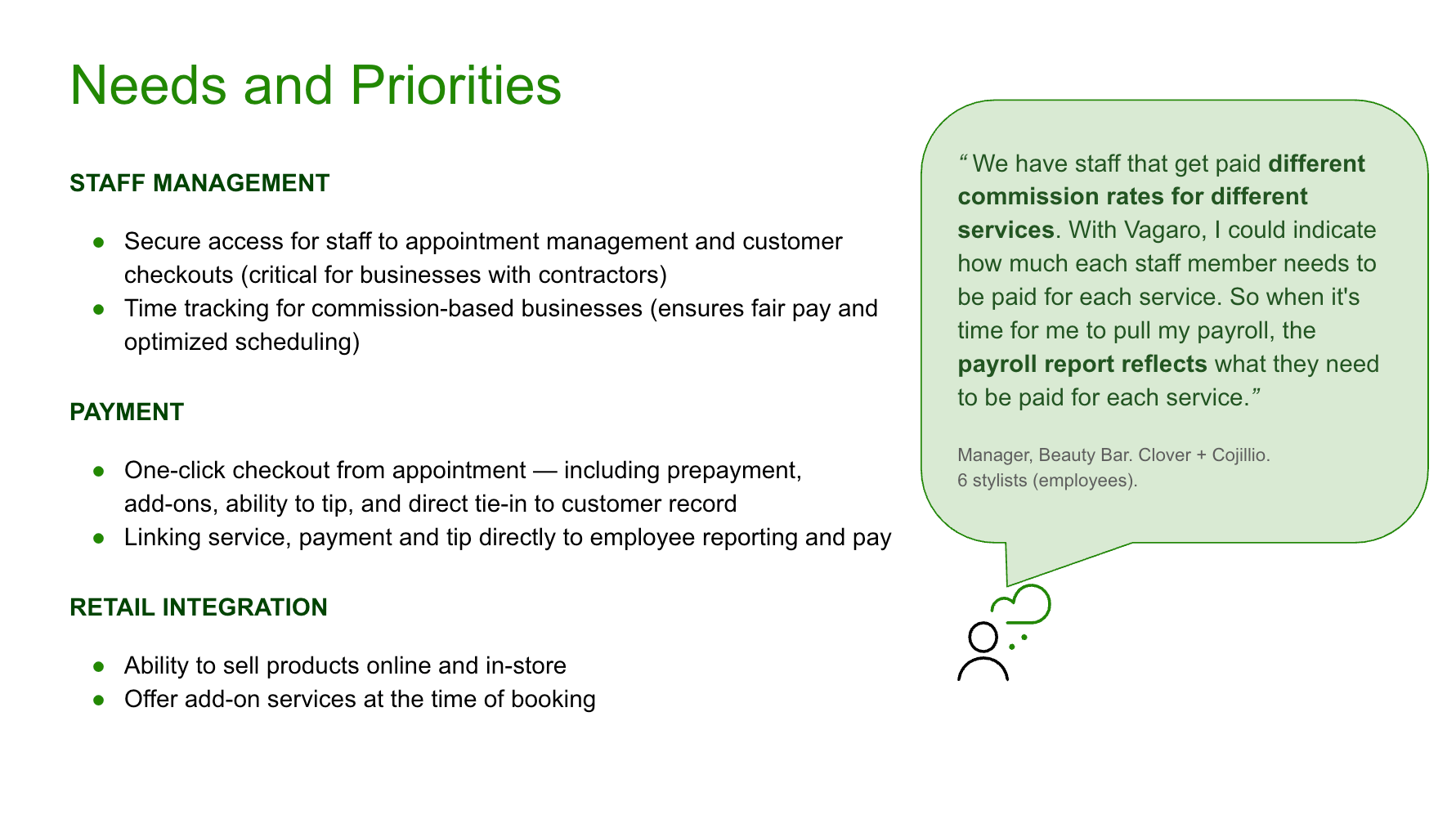Evaluating Appointment Scheduling Partner
Optimizing Scheduling for Service Merchants
Overview
Clover lacked a native appointment scheduling solution, leading many service merchants to rely on third-party apps or competitors. To address this gap, we began with a build vs. partner lens, initially focusing on whether Cojilio—a booking and appointment management app from the Clover App Market—could serve as a deeply integrated solution.
Research revealed critical usability, integration, and support issues that would have negatively impacted merchant adoption—ultimately informing the decision not to move forward with Cojilio. Insights from this work also shaped the requirements for future partner evaluations and laid the groundwork for a native Clover scheduling solution.
Clover’s native appointment booking solution
Background
I led this research in collaboration with Product, Design, Engineering, and Strategy to evaluate whether Clover should acquire or more deeply integrate with Cojilio, a third-party booking app. The team planned a Q1 2024 launch of a basic Services SaaS plan, starting with a lightweight pre-install.
Our goal was to support service merchants—many of whom remain on $0 plans due to unmet scheduling needs—with a seamless, integrated solution.
Research focused on whether Cojilio met core merchant needs and what issues could block or delay a successful launch.
Research Overview
This study began with the goal of evaluating Cojilio’s fit as an embedded scheduling solution for Clover, focusing on usability, adoption, and feature gaps.
As research progressed, insights surfaced along the way shaped the project direction, ultimately informing the decision to explore a native Clover solution.
We aimed to:
Understand merchant workflows, pain points, and expectations
Identify usability issues and feature gaps affecting adoption and retention
Surface launch blockers and assess post-launch needs
We took a layered, mixed-methods approach with personal service merchants (e.g., salons, spas, barbershops):
Unmoderated interviews with 8 non-Clover merchants to map the problem space
1:1 interviews with 14 Clover merchants using Cojilio to uncover real-world pain points
A survey (341 responses from 5,386 Clover merchants) to validate themes at scale and assess adoption barriers
Follow-up interviews with non-Cojilio Clover merchants to inform early thinking around a native solution
Timeline
UXR Process & Stakeholder Involvement
Met weekly with PM and Design to align on progress, priorities, and next steps
Shared UXR updates via Slack, including summaries of ongoing work
Participated in cross-functional MVP workshops and product evaluation sessions with internal teams and Cojilio’s PM and engineers
Brought user insights into early product discussions to highlight merchant needs, friction points, and guide product direction
During research:
PM and design partners were expected to attend all interviews they were available for
Shared interview invites and participant context ahead of sessions
Posted session summaries, highlight clips, and full recordings
Held informal debriefs to align on key takeaways
Presented findings to leadership and the MVP workshop group after each major phase
Scheduling Needs
of Personal Service Merchants
Merchants have specific needs when it comes to managing appointments, scheduling staff, sending reminders, and tracking compensation—such as custom commissions by service or product.
They rely heavily on mobile devices to manage their day-to-day.
While 42% use online booking tools and 46% still rely on manual entry, most want tools that make it easier to run their business on the go.
They prioritize features that improve the client experience—like SMS/email reminders, mobile-friendly booking, and simple, real-time communication.
Many also look for added value through loyalty programs and social media integrations to help them stand out.
Staffing models vary across businesses, often combining full-time employees, part-timers, and independent contractors.
The competitive landscape is wide, giving merchants flexibility to choose tools that match their needs—which raises expectations for Clover’s native offerings.
Personal service merchants prioritize features that enhance the client experience through communication and convenience.
67%
real-time appointment confirmations and reminders
via SMS and email
ranked among top three
most needed features
57%
mobile friendly (ie. easy to
use on phone or tablet)
ranked among top three
most needed features
42%
typically schedule
appointments through
online booking software
“Cojilio tells me it's a Clover issue and to call Clover and Clover tells me its a Cojilio issue and to call Cojilio”
Owner, Hair Salon
”Texting is huge as people do respond quicker than they do over phone and email.”
Owner, Massage Day Spa
“We have staff that get paid different commission rates for different services. With Vagaro, I can set different commission rates per service, and payroll reports automatically reflect the correct payouts.”
Manager, Beauty Bar
Impact
Following this research, Clover made strategic decisions to refine its approach to appointment scheduling and better serve service merchants:
Decision Not to Move Forward with Cojilio – Research revealed usability, integration, and support gaps, making it unsuitable as Clover’s embedded solution.
Informed Future Partner Evaluations – Findings established key criteria for evaluating third-party scheduling partners.
Development of a Native Scheduling Solution – Insights directly informed the product roadmap for a Clover-integrated appointment system focused on automation, mobile usability, and seamless POS integration.
This research set the foundation for Clover’s long-term appointment scheduling strategy, ensuring a seamless, merchant-first solution.
View Follow-Up Research & Product Evolution
from partner evaluation
to native solution
Reflections & Learnings
This project was a personal favorite because it exemplified a true cross-functional effort, with Product, Design, and UXR working as partners rather than in silos
What made it successful:
Stakeholders actively participated in interviews, debriefs, and strategy discussions, ensuring research findings directly influenced decisions.
Regular check-ins and real-time collaboration allowed the team to iterate quickly.
Clear research insights led to immediate action, shaping Clover’s scheduling roadmap.
This project demonstrated how strategic research drives impactful product decisions, keeping merchant needs at the core of Clover’s offerings.
It also reinforced that UXR impact isn’t just about driving new features or launches—it’s equally valuable in helping teams decide what not to build. In this case, research played a critical role in guiding the team away from a partner integration that didn’t fully meet merchant needs, opening the door to a more scalable, native solution.




